Text
So great to see this! Anti-intellectual times indeed (oof!)
Renowned Feminist Philosopher Judith Butler Tears Transphobic Feminism Apart
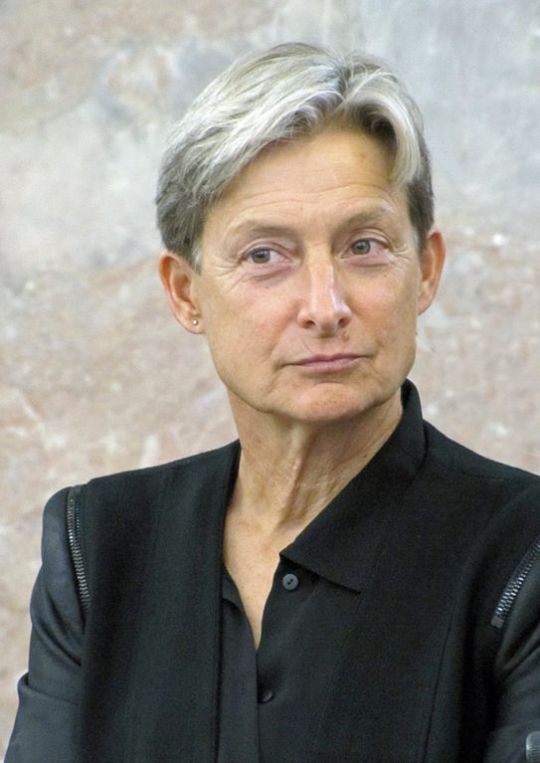
Judith Butler says that J.K.Rowling and the transphobic TERFs do not speak for feminism at large.
If you haven’t heard about Judith Butler before, here is a short summary: She is one of the most important gender theorists in modern times.
When right wing extremists despair about postmodern gender theory, she is probably one of the thinkers they are referring to (not that they have ever read her).
She has shown how social structures, language, the stories we tell and the roles we play strengthens the oppression and marginalization of women. In other words: For her gender is definitely a cultural and social phenomenon, and because of that she is on a collision course with the so-called “gender critical feminists” (TERFs) who want to reduce gender to biological sex.
I strongly recommend that you read the recent New Statement interview with Butler, where she addresses the thinking and the tactics of TERFs in very clear terms. The interview is behind a paywall, but you should be able to access a couple of articles for free.
Still – in case you are locked out – here are some important excerpts.
She refuses to think of transphobic TERFs as mainstream feminists.
I want to first question whether trans-exclusionary feminists are really the same as mainstream feminists. If you are right to identify the one with the other, then a feminist position opposing transphobia is a marginal position. I think this may be wrong. My wager is that most feminists support trans rights and oppose all forms of transphobia.
So I find it worrisome that suddenly the trans-exclusionary radical feminist position is understood as commonly accepted or even mainstream.
I think it is actually a fringe movement that is seeking to speak in the name of the mainstream, and that our responsibility is to refuse to let that happen.
She dismisses J.K. Rowling’s idea that allowing people to identify as they want will be a threat to women in women’s bathrooms.
The feminist who holds such a view presumes that the penis does define the person, and that anyone with a penis would identify as a woman for the purposes of entering such changing rooms and posing a threat to the women inside. It assumes that the penis is the threat, or that any person who has a penis who identifies as a woman is engaging in a base, deceitful, and harmful form of disguise.
This is a rich fantasy, and one that comes from powerful fears, but it does not describe a social reality. Trans women are often discriminated against in men’s bathrooms, and their modes of self-identification are ways of describing a lived reality, one that cannot be captured or regulated by the fantasies brought to bear upon them.
She dismisses the idea that the term “trans-exclusionary radical feminist” (TERF) is a slur.
I wonder what name self-declared feminists who wish to exclude trans women from women’s spaces would be called? If they do favour exclusion, why not call them exclusionary? If they understand themselves as belonging to that strain of radical feminism that opposes gender reassignment, why not call them radical feminists?
My only regret is that there was a movement of radical sexual freedom that once travelled under the name of radical feminism, but it has sadly morphed into a campaign to pathologise trans and gender non-conforming peoples.
My sense is that we have to renew the feminist commitment to gender equality and gender freedom in order to affirm the complexity of gendered lives as they are currently being lived.
She does not accept the idea that the term gender can be defined once and for all, for example in reference to biology.
We depend on gender as a historical category, and that means we do not yet know all the ways it may come to signify, and we are open to new understandings of its social meanings.
It would be a disaster for feminism to return either to a strictly biological understanding of gender or to reduce social conduct to a body part or to impose fearful fantasies, their own anxieties, on trans women… Their abiding and very real sense of gender ought to be recognised socially and publicly as a relatively simple matter of according another human dignity.
She also says:
It is painful to see that Trump’s position that gender should be defined by biological sex, and that the evangelical and right-wing Catholic effort to purge “gender” from education and public policy accords with the trans-exclusionary radical feminists’ return to biological essentialism.
It is a sad day when some feminists promote the anti-gender ideology position of the most reactionary forces in our society.
So there you have it: One of our leading feminist philosophers are comparing TERFs to the transphobic extremists of the right. And she is right to do so.
It is important to stress this: TERFs are not representative of feminism. They represent a toxic fringe movement that at this point in time does more to help right wing misogynists than women.
Judith Butler on the culture wars, JK Rowling and living in “anti-intellectual times”
Pink News has also covered this interview.
Butler criticized TERFs back in 2014, as well, as reflected in this interview.
Judith Butler: the backlash against “gender ideology” must stop
Photo: Adorno Preis
44K notes
·
View notes
Photo
Jackie Hormona was one of the key figures battling police during Stonewall, although Hormona’s later life is not known.
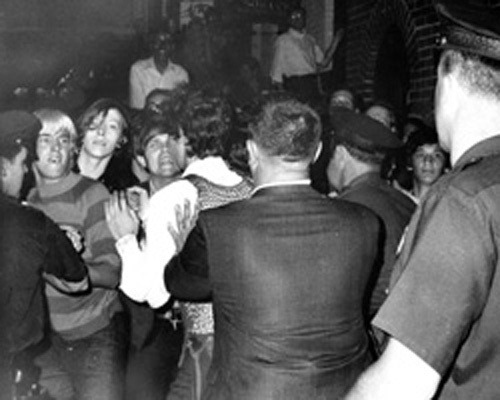
One of the few photos from the first night of the Stonewall Riots, photographed by Joseph Ambrosini. Featuring street queen Jackie Hormona (in the striped jumper) and several others whose names are unknown.
learn more about stonewall with queer as fact: a queer history podcast
83 notes
·
View notes
Link
Check out the podcast QueerasFact’s Stonewall special! An informative hour introduction to the uprising, with a very useful list of bibliographic sources for further research.
0 notes
Photo

IF YOU DON’T FIGHT FOR ALL WOMEN, YOU FIGHT FOR NO WOMEN

480 notes
·
View notes
Link
Absolutely true! Popular education on social media has created both an awareness of LGBTQ history and the need for it to be much more broadly taught.
“The dangers of forgetting our history are real. Younger generations, as much as they may want to learn about the past, have little access to the history of their ancestors. Because queerness is not commonly passed down among families, there is no transmission of generational knowledge in our homes; queer youth lack a built-in, widely accessible way to learn about their pasts. In the US, only two states — California and New Jersey — require that LGBTQ2 history be addressed in school, while no such rule exists in Canada. And this April in the UK, after significant controversy, the education secretary affirmed that there is no requirement to teach LGBTQ2 history in primary schools. So, in the absence of family stories or lessons in school, the rare mainstream representations, such as a Hollywood film like Stonewall, have the potential to skew queer people’s conception of their history.“
1K notes
·
View notes
Link
The first documentary to foreground voices from Stonewall was, not surprisingly, an audio one, created by Dave Isay in 1989 for Sound Portraits Productions, which later became better known as the invaluable oral history resource (and nonprofit) Storycorps. Storycorps has long been dedicated to preserving the voices and histories of everyday people. This documentary lnk also includes a transcript, so one can listen as well as read. Those Stonewall voices here include Stonewall veterans Martin Boyce, Sylvia Rivera, Mama Jean, and Robert “Birdy” Rivera, as well as other observers and LGBTQ people from the time.
0 notes
Photo
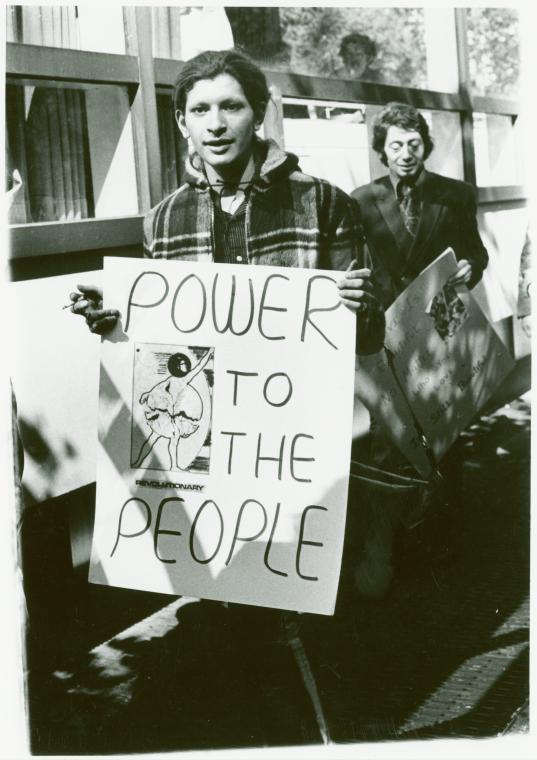
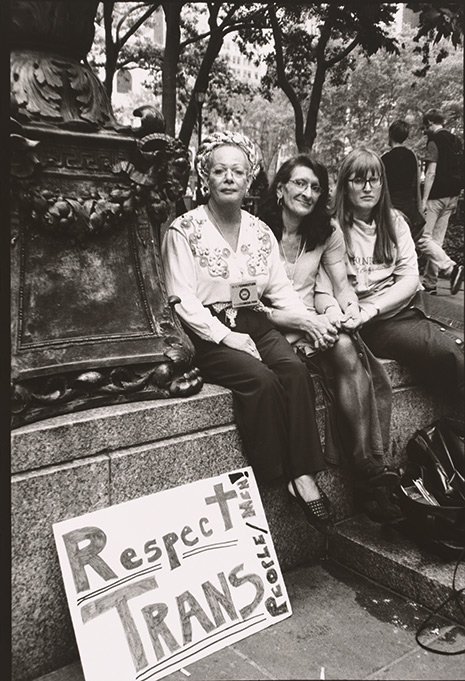

pride 2019 14/30 | sylvia rivera
Sylvia Rivera was an activist in New York City for over thirty years, fighting in particular for people who she felt were left behind by the gay rights movement: trans people, queer people of colour, and queer people living on the streets. In 1970, along with fellow activist Marsha P. Johnson, she founded STAR - the Street Transvestite Action Revolutionaries - which aimed to provide food, housing, legal aid, and other necessities to homeless trans youth. Sylvia herself was assigned male at birth, but around age eleven, in the presence of a large group of friends she had met living on the street, she was rechristened by a Pentecostal minister as Sylvia. She had relationships with both men and women, and said late in life: “I’m tired of living with labels. I just want to be who I am. I am Sylvia Rivera.”
for more queer history check out queer as fact: a queer history podcast
509 notes
·
View notes
Photo

published in the gay liberator no. 19, july 1972
5K notes
·
View notes
Photo
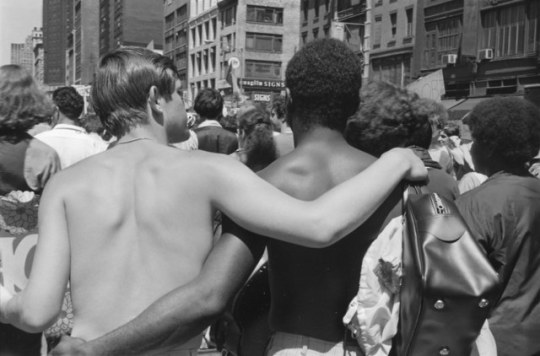
At the first Stonewall anniversary march, New York City, Fred W. McDarrah, June 28, 1970
3K notes
·
View notes
Link
Stonewall Anniversary edition of the New Yorker Radio Hour, featuring the great queer Russian commentator Masha Gessen interviewing key Stonewall historian Martin Duberman, as well as lesbian comedian Lea DeLaria, “Drag Queen Story Hour” at the New York Public Library, Russian queer activists, and comments from a non-binary self-described “queer black kid” Kristen on why they don’t want a fixed gender.
#stonewall 50#new yorker#masha gessen#lea delaria#martin duberman#drag queen story hour#queer youth#non binary youth
0 notes
Link
As part of the new Stonewall Forever Interactive site (https://stonewallforever.org/), this new bank of oral histories about Stonewall was recently released. They can be found on the site but are perhaps easier to access directly from YouTube (linked above). They contain 71 new interviews of people never hard from before as well as known Stonewall veterans and are an invaluable new resource. The project is ongoing, with histories added as they become available.
#stonewall 50#stonewall forever#oral histories#youtube#Stonewall oral history project#lgbt community center
0 notes
Link
Part of the new Stonewall Forever Interactive Project, this new documentary by Ro Haber seeks to “expand the voices of Stonewall by including more people in its telling”- it “brings together voices from over 50 year of LGBTQ activism, highlighting in particular trans people, people of color, and homeless people who were at the forefront of the movement and who have often been erased from the narrative. It explores how the activism of today stand on the shoulders of the activists who have come before.” Among these new voices is intersex activist and DePaul alum Pidgeon Pagonis! Highly recommended!
#stonewall 50#stonewall forever#documentary#lgbtq people of color#stonewall legacies#pidgeon pagonis
3 notes
·
View notes
Link
This interactive site is massive, and contains a new documentary about Stonewall and its legacies (with current activists as well as Stonewall vets) and a large bank of oral histories from the period that are available here and on the center’s Youtube Site: https://www.youtube.com/channel/UCX-RR3rC3RhY71uRTIvGqtw. Check it out!
0 notes
Quote
The day after the first riot, when it was all over, and I remember sitting, sun was soon to come, and I was sitting on the stoop, and I was exhausted and I looked at that street, it was dark enough to allow the street lamps to pick up the glitter of all the broken glass, and all the debris, and all the different colored cloth, that was in different places. It was as if an artist had arranged it, it was beautiful, it was like mica, it was like the streets we fought on were strewn with diamonds. It was like a reward. I really thought that, you know, we did it. But we’re going to pay dearly for this.
Martin Boyce in Stonewall Uprising: the year that changed America
learn more about stonewall with queer as fact: a queer history podcast
(via queerasfact)
122 notes
·
View notes
Link
In honor of the announcement that a monument has been commissioned to honor the life and work of transgender Black activist Marsha P. Johnson, I want to highlight the link to Michael Kasino’s 2012 documentary of Johnson, Pay It No Mind. This film seems to have been forgotten in the attention given to David France’s recent Netflix film The Death and Life of Marsha P Johnson (and the vital debates surrounding it ) but that film does not foreground Marsha’s story and voice, focusing instead on an investigation of the mystery surrounding her death (this is a common--and often unfortunate- Netflix framework for documentaries, which often sidelines the subject in pursuit of “who killed them?”). In contrast, Pay it No Mind makes Marsha central, telling her story through her last extended interview and through the testimonies of members of her community. Watching this makes it very clear how and why Marsha became so important and beloved in the Greenwich Village LGBTQ community (a “saint” and activist), particularly by other transgender women of color.
1 note
·
View note
Text
Transgender activists and people of color Marsha P. Johnson and Sylvia Rivera will (finally!) be commemorated for their activism with a monument
Both Johnson, who was African-American, and Rivera, who was Latina (Puerto Rican and Venezuelan) were involved in the Stonewall Riots in 1969, which has in part inspired their commemoration at this time, but their inclusion is also a belated recognition of their centrality and activism in the LGBTQ Greenwich Village community, specifically on behalf of transgender people of color, who were the most vulnerable and often marginalized people within it (nothing has changed in that regard).
https://www.nytimes.com/2019/05/29/arts/transgender-monument-stonewall.html
3 notes
·
View notes